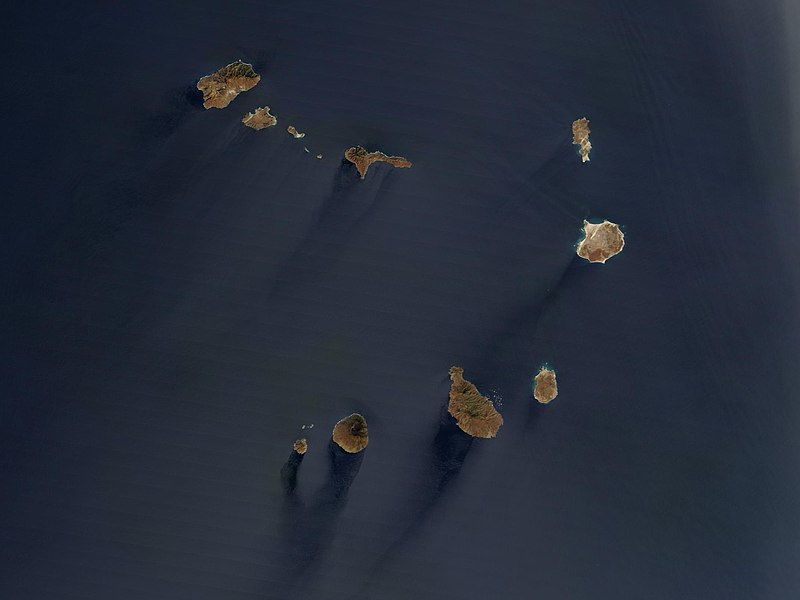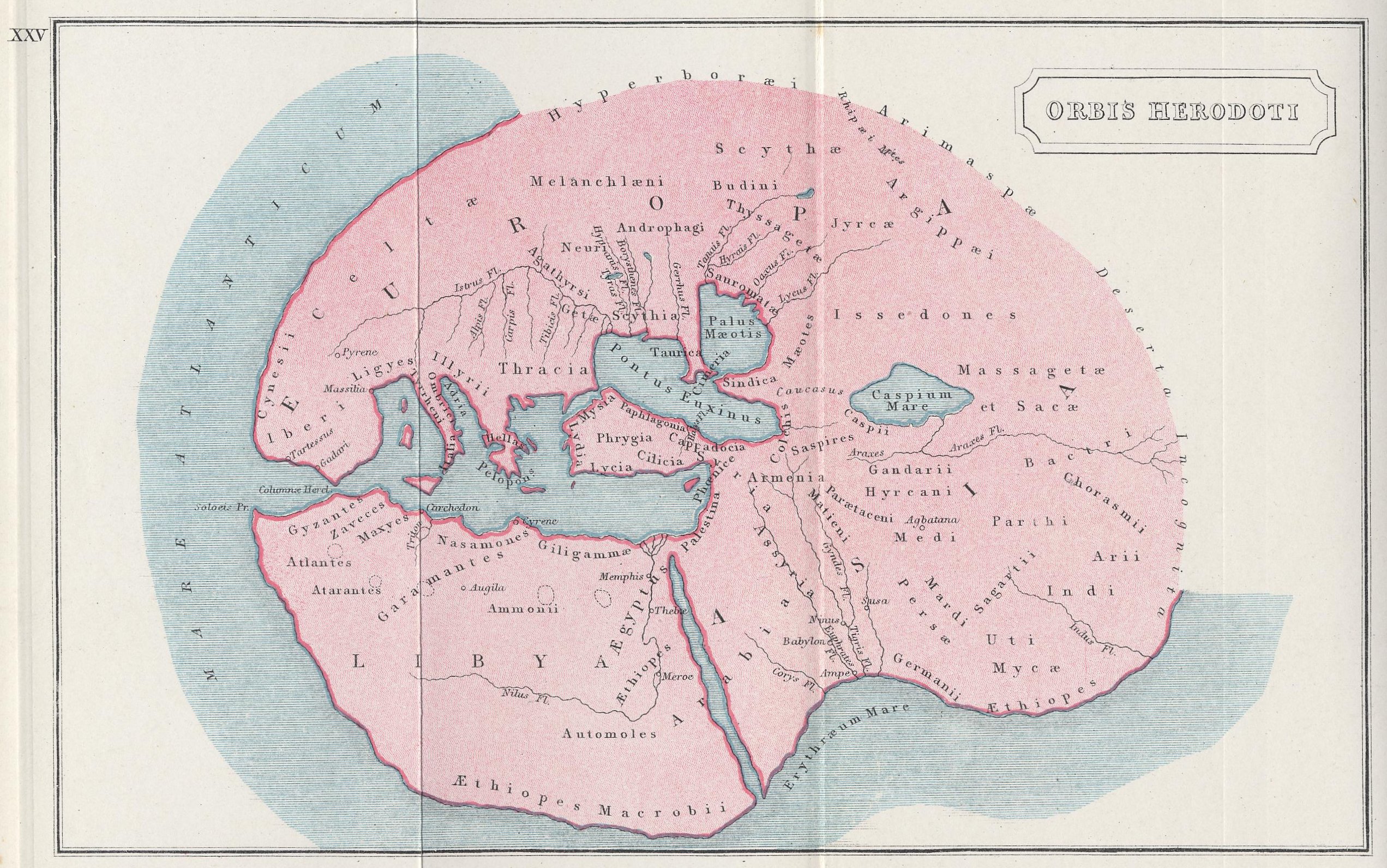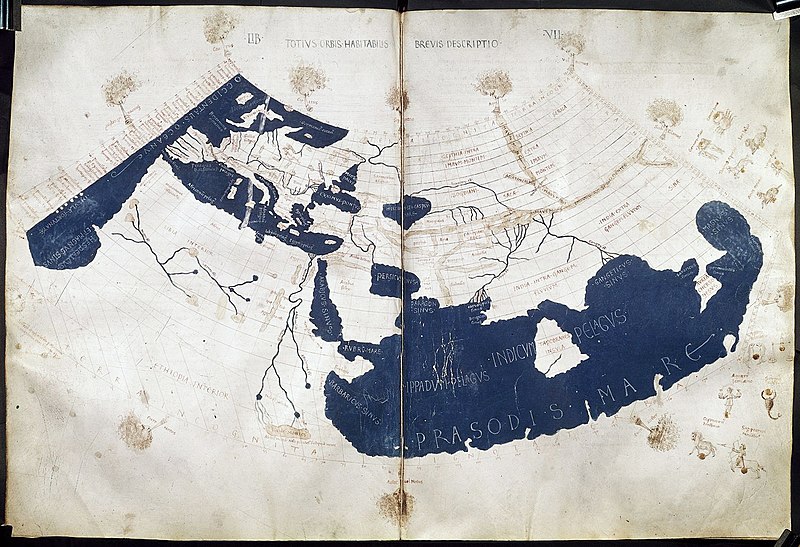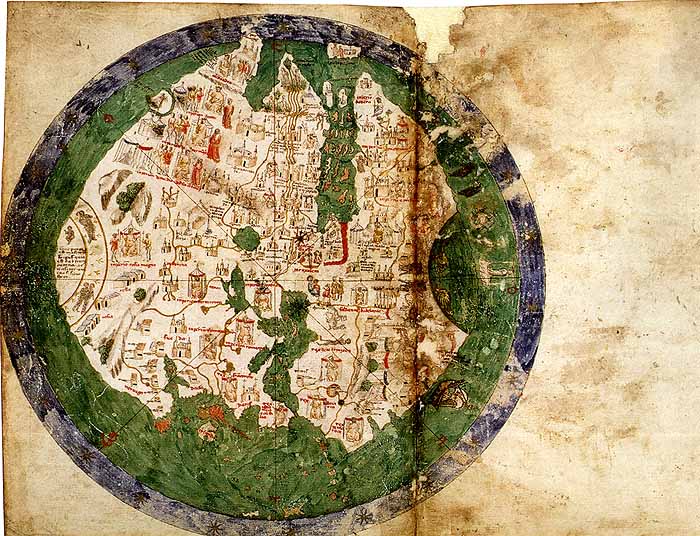
Os extraordinários Navegadores Portugueses descobriram o arquipélago de Cabo Verde provavelmente em 1456. Anteriormente existe a hipótese de o mesmo ter sido abordado pelo Cartagineses e de ser identificado com a INSULAE GORGADES, as Ilhas das Gorgonas.

Reprresentação do Mundo de Herodotus - «The Atlas of Ancient and Classical Geography» Samuel Butler (1907)

Mapa de Ptolomeu (150 depois de Jesus Cristo) recriado no século XV

Mapa de Andrea Bianco (1436)
Vejamos as palavras de Pliny the Elder «The Natural History»:
«(...) Polybius says
that Cerne is situate at the extremity of Mauritania, over
against Mount Atlas, and at a distance of eight stadia from
the land; while Cornelius Nepos states that it lies very
nearly in the same meridian as Carthage, at a distance from the
mainland of ten miles, and that it is not more than two miles
in circumference. It is said also that there is another island
situate over against Mount Atlas, being itself known by the
name of Atlantis. Five days' sail beyond it there are deserts,
as far as the Æthiopian Hesperiæ and the promontory, which
we have mentioned as being called Hesperu Ceras, a point at
which the face of the land first takes a turn towards the west
and the Atlantic Sea. Facing this promontory are also said
to be the islands called the Gorgades, the former abodes of
the Gorgons, two days' sail from the mainland, according to
Xenophon of Lampsacus. Hanno, a general of the Carthaginians, penetrated as far as these regions (...). Beyond these
even, are said to be the two islands of the Hesperides; but
so uncertain are all the accounts relative to this subject, that
Statius Sebosus says that it is forty days' sail, past the coast
of the Atlas range, from the islands of the Gorgons to those
of the Hesperides, and one day's sail from these to the
Hesperu Ceras. Nor have we any more certain information
relative to the islands of Mauritania. We only know, as a
fact well-ascertained, that some few were discovered by Juba
over against the country of the Autololes, upon which he established a manufactory of Gætulian purple.»
Vejamos também «The Voyage of Hanno, commander of the Carthaginians, round the
parts of Lilxya beyond the Pillars of Hercules, which he deposited in the
temple of Saturn» in A.H. L. Heeren, Historical researches into the
Politics, Intercourse and Trade of the Cathaginians, Ethiopians, and
Egyptians, anonymus translator (Oxford: D. A. Talboys, 1832), pp. 492-501:
When we had passed the Pillars on our voyage, and had sailed beyond them for two days, we founded the first city which we named Thymiaterium. Below it lay an extensive plain. Proceeding thence towards the west, we came to Soloeis, a promontory of Libya, a place thickly covered with trees, where we erected a temple to Neptune; and again proceeded for the space of half a day towards the east, until we arrived at a lake lying not far from the sea. and filled with abundance of large reeds. Here elephants, and a great number of other wild beasts, were feeding.
Having passed the lake about a day s sail, we founded cities near the sea, called Cariconticos, and Gytte, and Acra, and Melitta, and Arambys. Thence we came to the great river Lixus, which flows from Libya. On its banks the Lixitae, a shepherd tribe, were feeding flocks, amongst whom we continued some time on friendly terms. Beyond the Lixitae dwelt the inhospitable Ethiopians, who pasture a wild country intersected by large mountains, from which they say the river Lixus flows. In the neighbourhood of the mountains lived the Troglodytae, men of various appearances, whom the Lixitae described as swifter in running than horses.
Having procured interpreters from them, we coasted along a desert country towards the south two days. Thence we proceeded towards the east the course of a day. Here we found in a recess of a certain bay a small island, containing a circle of five stadia, where we settled a colony, and called it Cerne. We judged from our voyage that this place lay in a direct line with Carthage; for the length of our voyage from Carthage to the Pillars, was equal to that from the Pillars to Cerne.
We then came to a lake, which we reacted by sailing up a large river called Chretes. This lake had three islands, larger than Cerne from which proceeding a day's sail, we came to the extremity of the lake, that was overhung by large mountains, inhabited by savage men clothed in skins of wild beasts, who drove us away by throwing stones, and hindered us from landing. Sailing thence we came to another river, that was large and broad, and full of crocodiles, and river horses; whence returning back we came again to Cerne
Thence we sailed towards the south twelve days, coasting the shore, the whole of which is inhabited by Ethiopians, who would not wait our approach, but fled from us. Their language was not intelligible even to the Lixitae who were with us. Towards the last day we approached some large mountains covered with trees, the wood of which was sweet-scented and variegated. Having sailed by these mountains for two days, we came to an immense opening of the sea; on each side of which, towards the continent, was a plain; from which we saw by night fire arising at intervals in all directions, either more or less.
Having taken in water there, we sailed forwards five days near the land, until we came to a large bay, which our interpreters informed us was called the Western Horn. In this was a large island, and in the island a saltwater lake, and in this another island, where, when we had landed, we could discover nothing in the daytime except trees; but in the night we saw many fires burning, and heard the sound of pipes, cymbals, drums, and confused shouts. We were then afraid, and our diviners ordered us to abandon the island.
Sailing quickly away thence we passed a country burning with fires and perfumes; and streams of fire supplied from it fell into the sea. The country was impassable on account of the heat. We sailed quickly thence, being much terrified; and passing on for four days, we discovered at night a country full of fire. In the middle was a lofty fire, larger than the rest, which seemed to touch the stars. When day came we discovered it to be a large hill, called the Chariot of the Gods. On the third day after our departure thence, having sailed by those streams of fire, we arrived at a bay called the Southern Horn; at the bottom of which lay an island like the former, having a lake, and in this lake another island, full of savage people, the greater part of whom were women (...).»
Presidente da República de Cabo Verde com Jovens Cabo Verdianas (Foto de Daniel Monteiro Jr - Expresso 29-03-2013): Grande País de Expressão Portuguesa, Luso-Latina, de grandes Pessoas!
E no presente? O Presidente Jorge Carlos Fonseca refere na entrevista ao Expresso: «Era previsível que as remessas diminuíssem com a crise nos EUA e na Europa, sobretudo na zona euro, da qual a economia cabo-verdiana é neste momento particularmente dependente. Também era previsível a redução da ajuda pública ao desenvolvimento, a redução drástica do investimento estrangeiro em Cabo Verde. A prudência e a inteligência aconselham a que diversifiquemos as nossas relações e procuremos novas parcerias sem abandonar as clássicas. O volume de cooperação com Portugal diminuiu, como a ajuda orçamental e há mais dificuldade nas linhas de crédito. Temos de ser ousados, atrevidos, imaginativos e procurar relações com países como o Brasil e Angola. Porque não tentarmos uma aproximação com Singapura, Turquia, Índia, Colômbia? Reforçar as relações com a China, que é um parceiro tradicional e menos afectado pela crise. (...). Estrategicamente e a prazo, é importante estarmos na CEDEAO (Comunidade Económica dos Estados da àfrica Ocidental) (...) devemos procurar ser cada vez mais úteis nas nossas relações com a Europa e os EUA a nível da segurança marítima no Atlântico médio. (...) é (...) pela posição geoestratégica que a nossa cooperação é procurada por Espanha, EUA e Brasil. (...).»
«O Presidente dos EUA, Barack Obama, elogiou esta quinta-feira o desempenho de Cabo Verde que, em poucas décadas, evoluiu de um rendimento per capita de 200 dólares por ano para 4 mil dólares por ano, e concluiu que o arquipélago “é uma verdadeira história de sucesso”. O presidente norte-americano destacou ainda a gestão de Cabo Verde que vem colocando o país no meio da tabela em termos de desenvolvimento, tudo por causa, diz, da boa governação. (...)
Barack Obama fez estas declarações durante o encontro
que manteve (...), na Casa Branca, com o Primeiro-Ministro
cabo-verdiano, José Maria Neves, e com outros três presidentes
africanos (...) os chefes de Estado do
Senegal, (...), do Malawi, (...), e da Serra Leoa (...), com os quais o Governo americano diz ter “fortes parcerias com
base em valores democráticos comuns e interesses partilhados”.» «A Semana», Cabo Verde, 29-03-2013 (http://www.asemana.publ.cv/spip.php?article86480)
Portugal foi mal dirigido e tem custos de oportunidade intoleráveis com as péssimas opções de betão, alcatrão, fármacos, automóveis, submarinos, ... que alimentaram durante algum tempo a voracidade de oligopólios, cartéis, oligarcas e elites inter ligados com interesses Alemães, nomeadamente, e agora estamos fragilizados no apoio e interacção com Cabo Verde, nomeadamente. Mas poderemos também, criar parcerias criativas com o País Lusófono na ligação à sua e nossa diversificação de relações com o Mundo.


Sem comentários:
Enviar um comentário
Muito obrigado pelo seu comentário! Tibi gratiās maximās agō enim commentarium! Thank you very much for your comment!